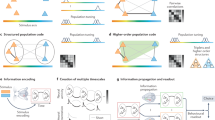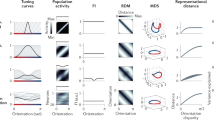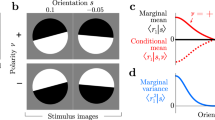Abstract
The amount of information encoded by networks of neurons critically depends on the correlation structure of their activity. Neurons with similar stimulus preferences tend to have higher noise correlations than others. In homogeneous populations of neurons this limited range correlation structure is highly detrimental to the accuracy of a population code. Therefore, reduced spike count correlations under attention, after adaptation or after learning have been interpreted as evidence for a more efficient population code. Here we analyze the role of limited range correlations in more realistic, heterogeneous population models. We use Fisher information and maximum likelihood decoding to show that reduced correlations do not necessarily improve encoding accuracy. In fact, in populations with more than a few hundred neurons, increasing the level of limited range correlations can substantially improve encoding accuracy. We found that this improvement results from a decrease in noise entropy that is associated with increasing correlations if the marginal distributions are unchanged. Surprisingly, for constant noise entropy and in the limit of large populations the encoding accuracy is independent of both structure and magnitude of noise correlations.
Similar content being viewed by others
Article PDF
Author information
Authors and Affiliations
Corresponding author
Rights and permissions
About this article
Cite this article
Ecker, A., Berens, P., Tolias, A. et al. The effect of noise correlations in populations of diversely tuned neurons. Nat Prec (2011). https://doi.org/10.1038/npre.2011.6170.1
Received:
Accepted:
Published:
DOI: https://doi.org/10.1038/npre.2011.6170.1
Keywords
This article is cited by
-
Noise correlations in neural ensemble activity limit the accuracy of hippocampal spatial representations
Nature Communications (2022)



